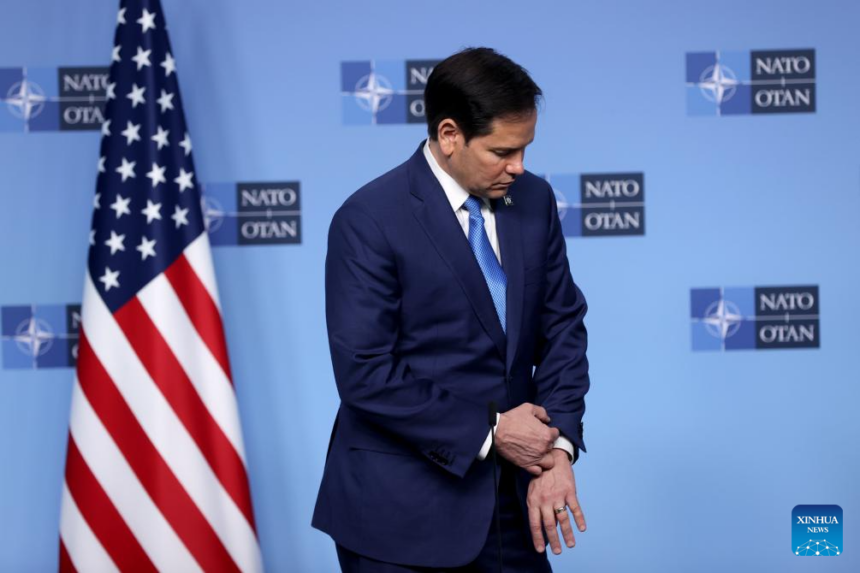U.S. Secretary of State Marco Rubio attended his first NATO foreign ministers’ meeting in Brussels on Thursday and Friday, where he reaffirmed Washington’s position that Europe should take more responsibility for defending the alliance.
As talks unfolded on critical issues such as the Ukraine crisis, defense spending, and NATO’s strategic direction, growing questions emerged about whether Europe can afford to acquiesce to U.S. goals at the expense of its own core interests and whether the terms of the transatlantic partnership should be redefined.
CONTENTIOUS GATHERING
Calling on European allies to significantly increase their defense spending, Rubio repeated Washington’s commitment to NATO at the meeting.
U.S. President Donald Trump is not against NATO but “against a NATO that does not have the capabilities it needs to fulfill the obligations that the treaty imposes upon each and every member state,” Rubio argued.
Trump has called on NATO members to raise their defense spending to 5 percent of GDP — a threshold that no member currently meets.
According to NATO estimates, 23 of the alliance’s 32 members met or exceeded the current 2 percent guideline last year, while major European economies such as Italy and Spain remain below the target, spending approximately 1.5 percent and 1.3 percent of GDP, respectively.
In a February interview with Tagesspiegel newspaper, German Defense Minister Boris Pistorius rejected the 5 percent target as “unrealistic and unnecessary,” arguing that such a level would consume nearly half of Germany’s federal budget.
The meeting’s atmosphere grew tense after Trump announced a “Liberation Day” tariff plan on Wednesday, which includes a 20 percent “reciprocal” tariff on EU imports.
Rubio refrained from commenting directly, but the latest tariff announcement triggered strong reactions from U.S. allies. Canadian Foreign Minister Melanie Joly warned that the relationship with Washington would “never be the same again,” while Belgian Prime Minister Bart De Wever remarked, “It becomes a little complicated to demand things from us … after we are constantly humiliated and insulted all the time.”
Rubio also avoided commenting on Trump’s earlier remarks about acquiring Greenland. Danish Foreign Minister Lars Lokke Rasmussen confirmed that he had “strongly objected” to the idea during his meeting with Rubio despite the topic not being formally on the agenda.
NATO Secretary-General Mark Rutte similarly avoided addressing these sensitive topics, saying only, “I think we should zoom out from Greenland,” and refrained from commenting on the trade dispute, noting that it falls outside the scope of alliance policy.
WIDENING TRANSATLANTIC RIFT
On Friday, Rubio canceled his planned final press conference at the close of the NATO meeting, citing a scheduling change.
The decision mirrored a similar arrangement in March when U.S. Vice President J.D. Vance’s visit to Greenland was scaled back to a brief stop at a remote U.S. military base after residents reportedly declined to meet him or his wife.
Though minor, these incidents reflect a broader unease with the U.S. diplomatic presence in Europe.
Last month, Trump suspended U.S. military aid to Ukraine and initiated direct talks with Moscow and Kiev, excluding European allies. The move sparked alarm across the continent, as officials feared being sidelined in a conflict unfolding on their doorstep.
In response, France and Germany urged more decisive European leadership, while eastern states pushed for greater defense coordination. “It’s not just about Ukraine,” Politico quoted one EU official as saying. “It’s about whether Europe still has a seat at the table.”
Meanwhile, reports that the United States is planning to reallocate military resources from Europe have raised further concerns on the continent about potential security gaps, particularly over how to replace critical enablers such as surveillance, refueling and command systems — capabilities still largely dependent on the United States.
Concurrently, the EU’s 150 billion euro (164 billion U.S. dollars) security action fund to support domestic defense industries — excluding U.S. firms — has drawn objections from Washington.
Trust was further eroded by the recent leak of Signal messages from Trump’s inner circle. The messages, which included operational chatter about U.S. strikes in Yemen, also revealed blunt disdain for European allies. Vance wrote that he “hated bailing out Europe again,” while U.S. Defense Secretary Pete Hegseth replied, “I fully share your loathing of European free-loading. It’s PATHETIC.”
European officials reacted with anger. “Despite the sometimes nice diplomatic words, trust is broken,” one EU diplomat told Politico. “There is no alliance without trust.”











